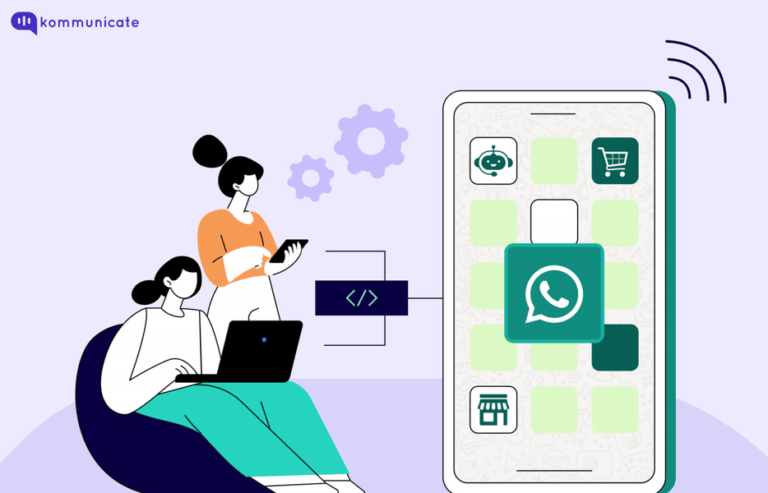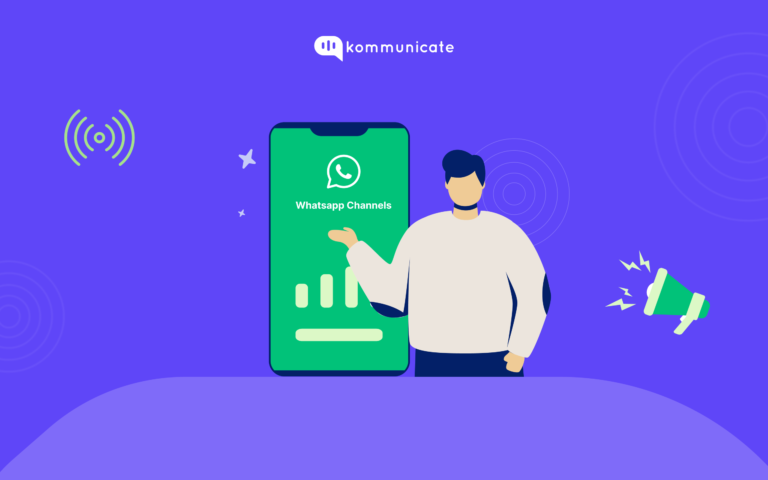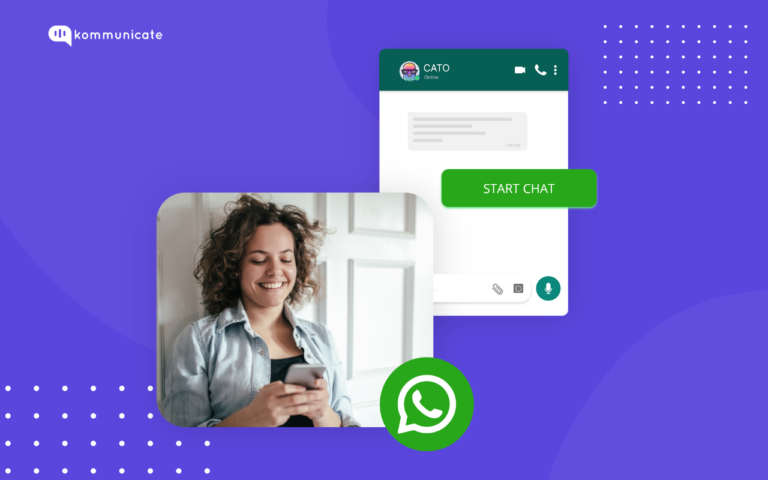Updated on July 4, 2023
It took almost a century for voice communication to upgrade to text messaging. It took hardly a decade for instant messaging to trump text messaging a.k.a SMS and become the primary mode of communication.
Think about it. Who sends an SMS any more than service providers sending one-time-passwords or the customary birthday wishes. SMS has taken a step back as a communication channel is an understatement. They merely exist as a backup plan when instant messaging is not available, which enjoys a staggering 99.99% uptime.
Why is WhatsApp winning over SMS?
Every now and then a new-age technology comes around and topples the pole position that its predecessor has been occupying. In telecommunication, it is WhatsApp dethroning SMS. There are several reasons why WhatsApp is winning over SMS.
WhatsApp is literally free. No carrier costs attached to instant messaging
You need a working data connection or WiFi connectivity to send and receive messages through WhatsApp. The bandwidth of WhatsApp messaging is minimal and does not cost a bomb in terms of carrier charges.
SMS charges, on the other hand, continue to be exorbitant in most parts of the world. It is only for specific carrier plans that SMS are cheaper or offered as a free utility. When compared side by side, WhatsApp is literally free. The cost factor is what is drawing millions of users to the app and making them send billions of messages on a daily basis.
One account for everything – voice and video calling
Until instant messengers like WhatsApp came over, users had to install multiple apps for multiple purposes. SMS was handled by the default app provided by OEMs (Original Equipment Manufacturers). For video calling one had to resort to Skype, Zoom, Viber, and similar apps.
All those efforts seem like belonging to another time in history. WhatsApp has integrated text messaging, voice calling, video calling, and even sending voice notes all into one chat interface. Also, users do not need multiple accounts to use these features. A single user account created with a phone number is sufficient for video and voice calling. As icing on the cake, there is no need for recharging or maintaining call credits.
Facility to send multimedia attachments
WhatsApp lets users send multimedia attachments just like how email lets you send attachments. One can send images, documents, map location, contacts, audio files, or even snap a picture straight from the app and share it without hopping from one application to another.
Recently, WhatsApp also integrated the option to send and receive money through the app. In other words, WhatsApp is like a Swiss Army knife for the digital world. With the single app, you can do everything from communication to even basic-level collaboration to get work done. It is no surprise that businesses are turning to WhatsApp to maintain and nurture relationships with customers.
Provision for chat backup on a regular basis
One of the downsides of SMS was that every time you swapped sims or even changed phones, all text threads were lost. There was no provision to take a backup, except with the help of the carrier. However, with WhatsApp, there is no such hassle in taking chat backups.
You can schedule chat backups on Whatsapp on a daily, weekly, or monthly basis. The backups are stored in the Google Drive folder chosen by the user. Whenever the WhatsApp account is reset or moved to another phone, the conversations are restored instantly. There is no loss of data compared to SMS where all data is lost without hope of recovery.
Gives message delivery indicators
With SMS, there is no option of knowing whether the message has been delivered to the recipient or it has been lost in transmission. Duplicate messages being delivered or messages getting truncated due to network issues or character limits were rampant when SMS communication was ruling the roost.
WhatsApp eliminated all such ambiguity in text communication by introducing delivery indicators. Although it created some ruckus when it was first introduced, today, it has become accepted as a definite means to determine the deliverability of a message. In fact, delivery indicators are also available for voice messages taking two-way communication to its completion.
Allows personalization and privacy of profile
Although not necessary for an instant messenger app, WhatsApp gives users the provision to create their personalized profile complete with profile pictures, short bio (with text and emojis). Businesses can even add their alternate contact information as well as map location. The profile personalization can be rightly used as a virtual visiting card when it is time to share contact information.
Further, WhatsApp also gives advanced features for protecting the data privacy of the user. Users can choose to show their profile information only to contacts, or to all. Further, they can also determine who can see their statuses, their display picture, and also their read receipts.
Business-friendly features
SMS marketing has been the staple marketing channel for most businesses. However, it had several downsides that left businesses in the lurch. To begin with, SMS allowed businesses only to send textual content, there was no possibility to share multimedia content. Further, SMS used a phone number that cannot be customized to appear business-like.
Compared to SMS, WhatsApp gives countless business features that make outreach, prospecting, lead generation, and customer support a breeze. It allows businesses to communicate as an entity and not as an individual as is the case with SMS. further, it can be used to send product catalogues, canned responses for FAQs, etc. WhatsApp makes customer communication effortless and interactive compared to SMS which often ends up as a one-way communication channel. It is even possible to create a WhatsApp chatbot with which businesses can deliver a top-notch customer experience.
Why is SMS still used for?
Currently, a small population of businesses is using SMS largely for marketing purposes. Further, it is also used for specific purposes that are best suited. Despite its paucity in features, SMS does assure data security as it cannot be intercepted easily like messages sent across data networks. For that reason, SMS communication is still used for:
- OTPs – Banks and financial institutions use SMS to deliver one-time passwords forming part of two-factor authentication.
- Account recovery – Recovery codes for emails and similar accounts are shared via SMS. it ensures that it is the account holder with the same phone number who is requesting for a change in the password or is attempting to recover it.
- SMS marketing – To send bulk SMSes carrying a business offer, request for sign-ups, demos, walk-ins, etc.
Why ‘NOW’ is the best time to switch to WhatsApp for business
Despite its benefits, does SMS have a place in the future where WhatsApp is headed? Turns out, not much. As mentioned earlier, SMS might be used as an alternative or as a temporary fix when WhatsApp cannot be used (for example, when there is no data connection).
Bonus: How to Get a WhatsApp Business API account in an Easy Way
Real-time communication
Millennials are the social generation. They are always hooked in real-time to one social media channel or another. As a result, they expect communication to be synchronous and happening in real-time. Especially when they are communicating with businesses for inquiries or for post-sales customer support.
WhatsApp fits the bill perfectly as real-time communication is its default offering. Businesses can engage in real-time communication with customers enabling them to dole out information that customers are seeking or in providing assistance in solving customer support queries.
Most popular means of communication
WhatsApp is the leading global mobile messenger with a whopping 2,000 Million monthly active users. Others like Facebook Messenger, WeChat, QQ, Telegram, etc. fall back severely in user numbers.
As the most popular means of communication, WhatsApp has become a must-have for business communication. Also, it does force users to install a new app. Customers can use their personal WhatsApp account to communicate with businesses thus removing all friction that exists in customer communication.
Canned responses for FAQs
One of the difficulties of providing customer support is handling a large volume of repeating queries. FAQs on the website might provide some respite, however, most customers may not bother visiting the website to find the solution.
With WhatsApp, businesses can quickly provide canned responses to frequently asked questions of customers. It gives customers immediate feedback while sparing support agents from having to respond to every basic customer question, expending their valuable time and energy.
Built-in product catalog
WhatsApp can work as a mini-portal where customers can view product catalogues. WhatsApp for business allows businesses to upload their product catalogue complete with images, descriptions, and pricing. This helps drive specific contextual conversations with customers and can also maximize lead generation.
24/7/365 customer support
WhatsApp for business lets you set up auto-replies or away messages that will respond to incoming messages with default replies. Further, WhatsApp chatbots can also be configured to converse with customers like a human agent would using Artificial Intelligence and Machine Learning to understand user sentiments, queries and provide contextually relevant responses. The good news is, they can work round the clock, 24/7/365 without any break. This makes them a perfect companion for businesses that work across multiple time zones.
Affordable customer communication
Setting up a WhatsApp account for business communication doesn’t cost a bomb. It does not require any additional app development or integrations. Of course, you can add to the app’s functionality through integrations, however, to perform basic functions these are not essential. As a result, the cost involved in using WhatsApp for customer support or lead generation is minimal.
In a nutshell
By now you must have understood that the days of SMS are over and WhatsApp is here to stay. Even the competition from other instant messaging apps has not affected WhatsApp as it continues to grow in user base as the default instant messenger.
For businesses, WhatsApp offers a simple and intuitive mode of communication. It does not require a new app or any additional investment. It offers maximum value for the time and resources spent.
Why ‘NOW’ is the best time to switch to WhatsApp for business.
At Kommunicate, we are envisioning a world-beating customer support solution to empower the new era of customer support. We would love to have you on board to have a first-hand experience of Kommunicate. You can signup here and start delighting your customers right away.








